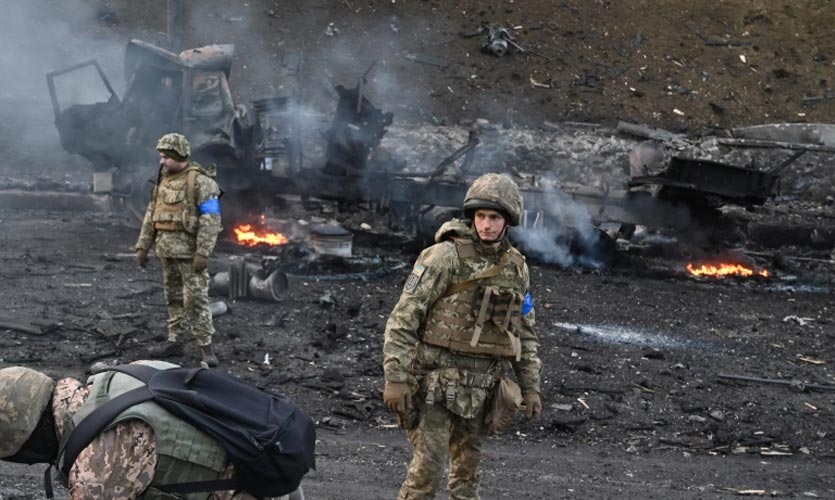Russian forces invaded Ukraine on February 24, inviting heavy condemnation from world leaders, especially from the Western bloc led by the United States. The Russian invasion marks the biggest attack by one state on another in Europe, since World War II.
The Western bloc continues to impose stringent economic sanctions on Russia for its military actions over Kyiv, as it contemplates banning Russian oil imports. In retaliation, Russia has been stepping ahead with more military adventurism, with President Vladimir Putin ordering his defense chiefs last week to put the country’s nuclear “deterrence forces” on high alert, and accusing the West of taking “unfriendly” steps against his country. It is pertinent to note here that Russia has the world’s largest arsenal of nuclear weapons, and a huge package of ballistic missiles that forms the backbone of Russia’s deterrence forces.
The decision created shockwaves and unearthed fears that many thought had passed after the Cold War. Putin also warned the Western bloc and NATO against aggression towards Russia and pinpointed that anyone who dares to interfere in this crisis would have to face harsh repercussions from the Kremlin.
Russia’s all-time ally in the region, Belarus President Alexander Lukashenko, has also reacted to these events and warned that the West is pushing Russia into World War III by imposing stringent economic sanctions.
Advantage Russia
At this critical point of time, Russia is again in the limelight, demonstrating its military might and highlighting that it is still a global power, a status that became debatable after the fall of the Soviet Union.
Russia’s armed invasion of Ukraine demonstrates its real agenda to send a message to the West and assert that NATO should withdraw from its backyard.
If Russia wins this war by gaining control over Ukraine, or by destabilising it, it will be the beginning of a “new era”, where leaders will have to rethink European security.
Russia has a greater proportion of arms, missiles and other military equipment when compared to Ukraine, much to the dismay of the West. The United States and its allies could find themselves deeply unprepared for the task of having to create fresh dynamics of European security as a result of Russia’s actions.
If Russia comes out on top in this conflict, it could mean the installation of a puppet, docile government in Kyiv or even the partition of the country. If this happens, the US, NATO and the EU bloc will then have to face its biggest loss in decades, and Ukraine could become a buffer zone between NATO and the Kremlin. “Instead, security in Europe will have to be reduced to defending the core members of the EU and NATO. Everyone outside the clubs will stand alone, with the exception of Finland and Sweden,” speculates a report by Foreign Affairs. The NATO has been deploying its troops near Ukraine’s borders to tackle the threats posed by Russian forces. The EU and NATO member states will never recognise a Russian-backed regime created by Moscow in Ukraine.
More than 500,000 Ukrainians have left their native land and have been forced to seek refuge in neighbouring countries such as Poland and Romania, among others, as estimated by the UNHCR. A refugee crisis could create more problems for the EU and will continue to embolden Russia’s stand.
A Resilient Kyiv
After being under attack for two days, the Ukraine President’s Office had claimed that the Russian Armed Forces had not gained any operational or tactical advantage in 24 hours. Putin had possibly presumed that the NATO would not send its troops into Ukraine. Moreover, Europe’s dependence on Russian oil and gas would make countries like Germany hesitate about imposing stiff sanctions. However, 10 days later, NATO member states are not just condemning Russia but also sending huge military supplies to Kyiv.
Russia has bene repetitively saying that the Kyiv regime should surrender, and that people should leave, but President Volodymyr Zelenskyy has refused to flee the capital and has been urging the West bloc to supply them with more arms and equipment.
There have been protests in Russia against Putin’s military actions, with the Moscow government detaining at least 6000 people for coming out to demonstrate. It seems that this conflict is unlikely to be resolved in a short span of time, given the kind of unexpected resistance Kyiv forces are presenting to the Kremlin.
There are numerous reports of air raid sirens being heard in Kyiv, Kharkiv and other cities such as Vinnytsia, Uman and Cherkasy. Russian shelling has also hit a maternity hospital in the village of Buzova near Kyiv, which is likely to bring more condemnation and isolate Putin further.
While Russia is self-sufficient in terms of resources, trade sanctions could seriously impact the country as well as its partners, in the long term. This also leaves most countries, including India, open to the threat of a catastrophic inflation. India and other countries who have also abstained from condemning Russia, could also expect a slew of sanctions that could send the various economies into a tailspin if Russia is overpowered.










